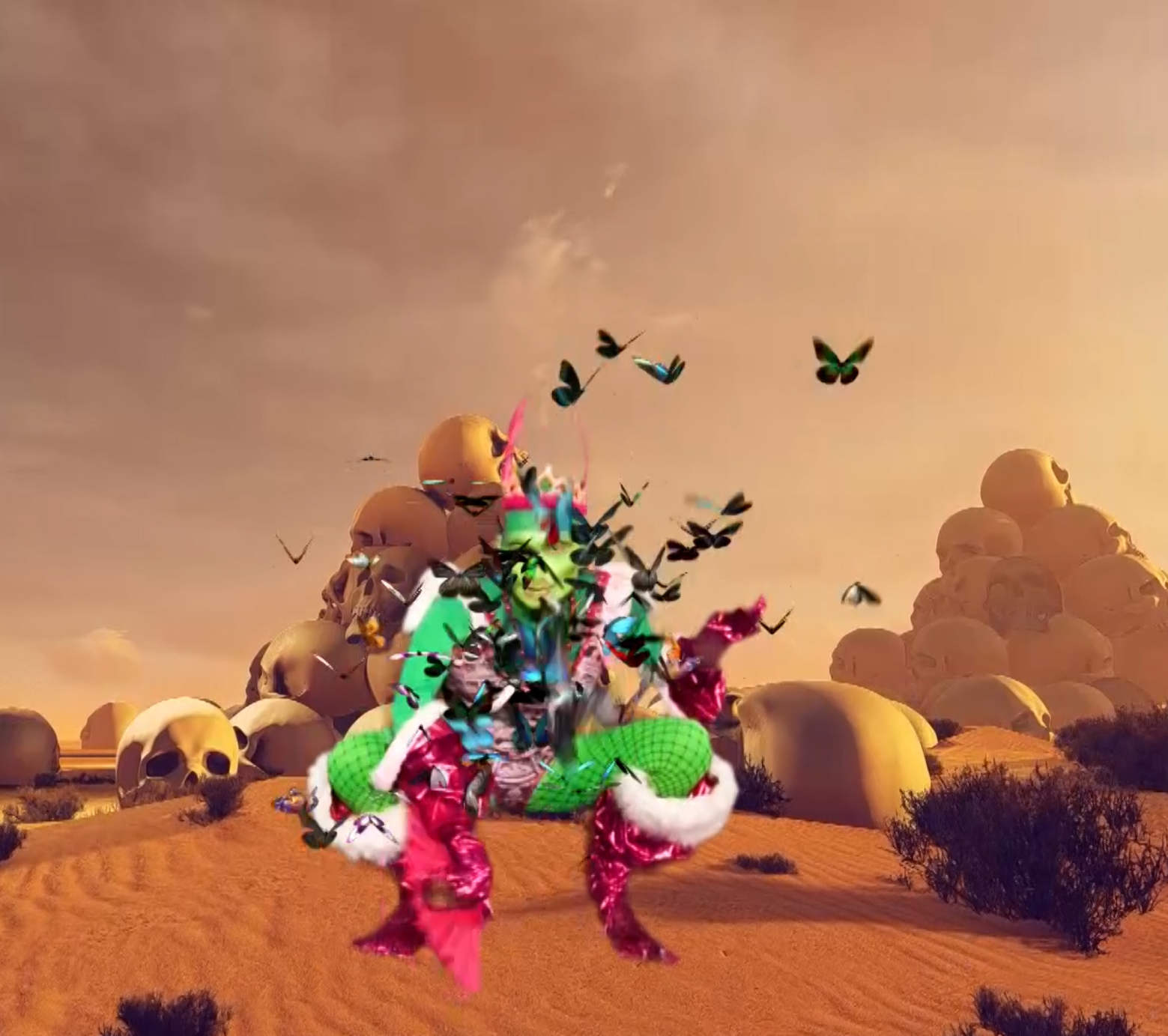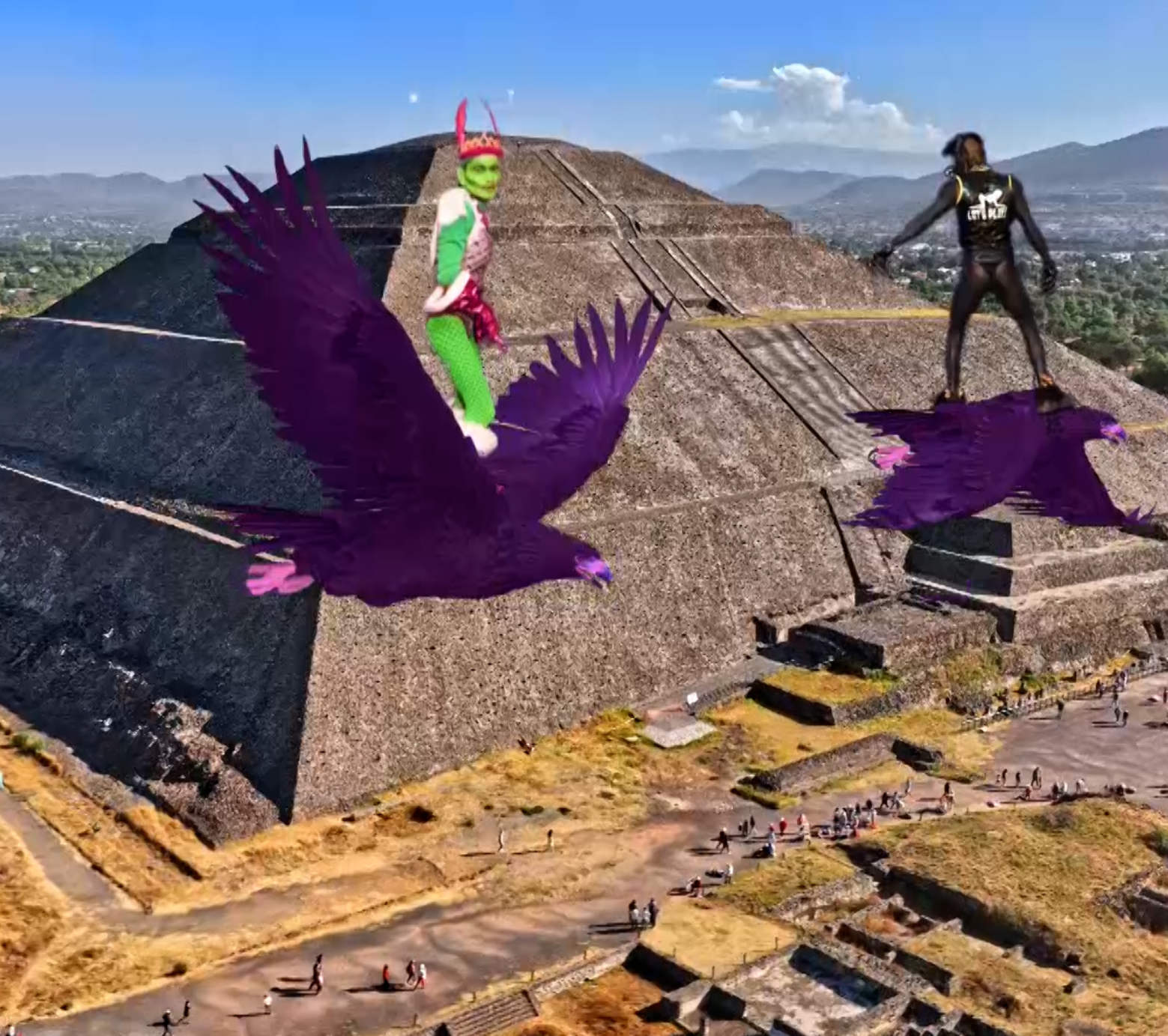Sala10: Javier Ocampo
virtual exhibition
DECOLONIZE YOUR ASS
In this videoclip, Javier Ocampo combines allusions to Mesoamerica’s precolumbian past with references to contemporary mass culture in a kitsch/neobaroque delirium that transgresses the hegemony of heteronormative identity. The artist, in iguana and xoloitzcuintle drag, uses his body as a vehicle to mock and disarm racist regimes. To the rhythm of queer electro-reggaeton, this piece raises the possibility of dancing to decolonize your ass. The song deploys lyrics that celebrate difference and resignify homophobic and pigmentocratic insults in search of a new reality that transforms wounds and resentment into celebration and empowerment.

Rejoicing in Difference: Notes on Insistence
Does my sexiness upset you?
Does it come as a surprise
That I dance like I've got diamonds
At the meeting of my thighs?
Out of the huts of history’s shame
I rise
From the Maya Angelou poem “Still I Rise”
DECOLONIZE YOUR ASS arose from the artist’s research trips to the Xochicalco archaeological site. Each time he visited this iconic location in the state of Morelos, along the road he encountered sound systems or Sonideros, which form part of the everyday cultural life and landscape of the surrounding towns. Inspired by this, Javier Ocampo got the idea of generating a transhistorical collage by crossing the musical genres of contemporary Sonideros with references to the Mesoamerican past, its continuities, disruptions and potential for superimposition. The video, recorded with a green screen, overlays the artist’s body on images of the pyramids of Teotihuacán and Uxmal, as well as digital backdrops depicting imaginary environments, such as other fictitious pyramids, neon highways and dive bars. Through the use of extravagant prosthetics, makeup and costumes, the artist becomes a slutty iguana descending from a spaceship—ironically playing with the idea that the Indigenous other is so strange that it can only come from another world—to dance to the rhythm of electronic reggaeton.

The piece takes the form of a music video, in which the dancing body also becomes a rabid xoloitzcuintle in bondage gear. Toward the end of the video, both figures dance as a meteorite falls to Earth, bringing one order of things to an end in order to give way to another form of existence.
While homosexuality implies a confrontation between desire and the status quo, its assimilation into capitalist normality has neutralized its power of political dissidence. The reflective dimension known as queer theory, which arose at the end of the twentieth century in academic circles in the United States, has been criticized precisely for overlooking the intersection of sex and gender diversity with racial segregation, geopolitics and social difference. In the Global South, there has therefore been an insistence on addressing homosexual experiences that intersect with the experiences of inhabiting racialized, exoticized, repressed and exploited bodies. Homophobia, transphobia—and another list of phobias—that give form to white oppression are questioned by new artistic and theoretical developments through the notions of “the commons,” brownness, blackness or difference;[1] these proposals aim to tear down the dominant social structures in order to imagine possibilities in which the systematic violence suffered by minorities gives way to another order of coexistence beyond mere forced, corporate inclusion. In this sense, these struggles keep alive the affiliation between homosexuality and other political demands with which it has historically been associated.[2] In Mexico, the assimilation of homosexuality has been defined by a series of codes derived from the territory’s historical and cultural particularity.

Bolívar Echeverría—in his reflections on the baroque ethos and the development of modern whiteness in Latin American territories—had already suggested the impossibility of translating the anglophone queer experience to the ways in which the exclusion of and violence against sexual and gender diverse individuals has been coded in Latin American Catholic societies.[3] Unlike what happens in North American Puritan culture, the dominant baroque subject “feels adjacent, affected, compromised by the ‘anormality’ or ‘strangeness’ of the homosexual, and attempts to distance himself even if it requires violence.”[4] This is why the hostility toward homosexuality is experienced more directly in the criollo/Catholic context, intersecting with many layers of segregation, mestizaje and erasure of Indigenous cultures and forms of knowledge. This all comes to the surface when contemporary art and performance counterpose the everyday order with images from the past, analyzed with new eyes.

Acknowledging this violence, Javier Ocampo’s work is characterized by its direct connection with his experience, his body and his way of radically inhabiting difference. In this situated exploration, the artist has disarmed the codes of national identity by climbing the pedestals of the sculptures of great men and heroes in order to grope their effigies, impetuously swallowing a chocolate in the form of an Olmec head or suggesting the use of a clay figure of a warrior as a dildo to “recharge the energy or necessity of identity.” This body of work largely arises from a gesture that, in performance, rehearses ways of disarming traditional and hegemonic structures: whether by wearing outfits that combine Mesoamerican iconography and sexuality or by connecting the practices of homosexual desire with flight from the systematic segregation of the brown body. These superimpositions of meanings suggest connections with personal memory and the affective marks left by social structures upon subjectivity.

Just as the late eighties painting style known as Neomexicanism incorporated Catholic iconography, patriotic symbols and references to the Mesoamerican past, Ocampo’s actions confront our inertia in the routine of heteronormative nationalist discourses. Nevertheless, his production acquires a particular power and complexity through its assimilation by the artist’s body, transgressing his own identity and generating images that denounce the instrumentalization of an idealized Indigenous past that has been dispossessed of all reality, as well as the identitarian rhetoric that gave rise to the homogenizing fiction of racial and cultural mestizaje in a pluriethnic territory. In this sense, the discussion of homosexuality in Javier’s work is intersected by other orders of oppression through the use of local, cultural and popular codes, such as the use of extravagant costumes, acrylic nails, harnesses and jockstraps, which contrast with the headdresses, Mesoamerican souvenirs and leather sandals that are stereotypically connected with rural Mexican life.

Disrupting the candied vision and acritical repetition provoked by the normalization of homosexuality, Javier Ocampo’s work reminds us that discomfort is vital for structuring rage and disarming systematic violence. The codification of a sort of “white triumph of homosexuality” erases ongoing struggles and transgressions and replicates their exclusion. This is therefore a work of insistence: questioning the place of homosexuality in a society that only wants to accept that “love is love,” but that doesn’t see the implications of cultural cannibalism or the liberatory power of inhabiting a fearless sexuality, of the abject and grotesque implied by accepting bodies in all the complexity of their fluids. These operations confront a whiteness that, as the structural norm, ignores its own violences and washes its hands of their implications. Through humor, stridency and excess, the artist makes exhaustion and indignation more bearable. This model of artistic production allows for an enunciation that mocks the unsustainable nature of traditional systems and the arguments that support them. As Mckenzie Wark has suggested, this operation hacks the order of sensibility, intervening in contemporary abstractions to create a distinct order that not only implies a cultural shift, but also struggle, “for what the hacker calls into being in the world is a new world and a new being.”[5]
Jaime González Solís

[1] For the Latino experience in the context of white North American hegemony, see the posthumous book by José Esteban Muñoz, The Sense of Brown, Durham, NC: Duke University Press, 2020.
[2] Such as communism, as Tim Dean explains regarding the iconic book by the Italian Mario Mieli. Tim Dean, “Foreword ‘I Keep My Treasure in My Arse,’” in Mario Mieli, Towards a Gay Communism, London, Pluto Press, 2018, p. 10.
[3] Bolívar Echeverría, “Queer, manierista, bizarre, barroco,” Debate Feminista, October 1997, vol. 16, pp. 3-10.
[4] Idem.
[5] Mckenzie Wark, A Hacker Manifesto, Cambridge, Mass., Harvard University Press, 2004.

Faggotification as Hacking:
A Conversation Between Javier Ocampo and Jaime González Solís
Jaime González Solís (JGS): Your practice arises from the experience of inhabiting difference through having a brown body in a racist country and being a homosexual in a primordially homophobic society. [...]
COMPLETE TEXT HERE

Javier Ocampo Hernández
DECOLONIZE YOUR ASS, 2023
Video
3’ 27”
Music: Ángel Mañón
Courtesy of the artist
Javier Ocampo (Cuernavaca, 1988; he lives and works in Cuernavaca, Mexico)
Javier Ocampo has a bachelor of arts from the Autonomous University of Mexico State (UAEM) and a Master’s in Artistic Production from the same institution, the latter with the support of the 2015-2017 CONACyT research grant. He was selected for the ECOES-Santander Student Mobility scholarship at the University of Guadalajara (UDG), the PECDA Morelos grant in 2016, 2022 and 2024 and the FONCA With You at a Distance grant in 2020. He came in first place in the MUAC’s Fifth University Video Art Contest in 2015. Since 2008, his work has been selected and exhibited in contemporary art competitions, biennials and festivals, both domestically and internationally. He has given artistic production workshops for Tallera Siqueiros and Los Chocolates Cultural Center. He currently explores the concepts of whiteness, pigmentocracy and cultural colonialism in Latin America, particularly Mexico. His central concerns are social and political. Through video performances and installations, he has explored a wide variety of materials that complement the discourse of his pieces.


